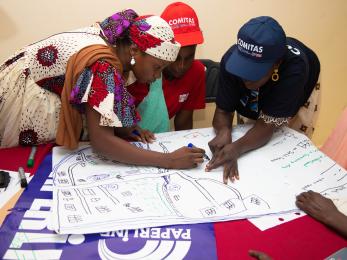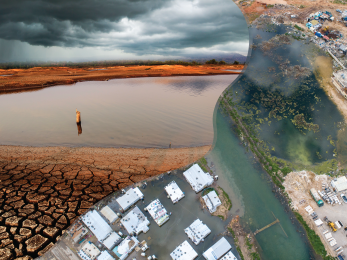Mercy Corps Releases Report on Climate Action in the Livestock Sector
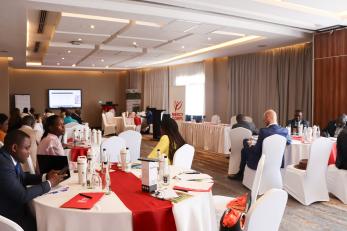
Uganda, currently ranking 13th globally in terms of vulnerability to climate change, particularly in the livestock sector, is facing an urgent crisis. With the current climate changes, this vulnerability will likely worsen, posing significant risks to the country's livestock industry. Mercy Corps, having worked alongside pastoral and agro-pastoral communities in Uganda's Karamoja region for over a decade, launched a report on July 23rd, 2024, titled “Climate Action in Livestock: Policy Insights and Carbon Solutions.” This report delves into policy dialogue on livestock, climate change adaptation, and mitigation.
At the launch event, attended by senior officials from the Ministry of Agriculture, Animal Industry, and Fisheries (MAAIF) and the Ministry of Water and Environment(MOWE), as well as other esteemed stakeholders, James Love, the Country Director of Mercy Corps Uganda, delivered opening remarks. He underscored the urgent need to address the intersection of climate change and livestock, recognizing the government’s pivotal role in this initiative.
“Mercy Corps is working with the government to achieve the national development plan and other key policies. It is important to prioritize adopting climate-smart livestock management practices to mitigate the impacts of climate change,” he highlighted.
Livestock, comprising cattle, goats, sheep, pigs, and poultry, is vital to Uganda's economy and a vital lifeline. It supports over 4.5 million households, of which 70% are rural. Notably, the sector relies heavily on rangelands, which cover 40% of Uganda's land surface and stretch from Karamoja to Sembabule, commonly called the “cattle corridor.”
Building on the importance of this sector, the Honourable Minister of State for Animal Industry, Bright Rwamirama, stressed the significance of the policy coherence report in his speech as the launch’s guest of honor. He referred to it as a matter of paramount importance to Uganda and its potential to future-proof Uganda’s livestock, climate action, and sustainable development. He underscored the necessity of this report, highlighting its importance in addressing critical issues in the livestock sector.
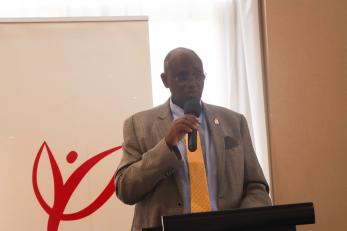
“As the backbone of many communities and a key pillar of Uganda’s economy, the livestock sector faces unprecedented challenges due to climate change, the impact of climate change, rising temperatures, altered rainfall patterns, failed water conditions, and increased frequency of extreme weather events, presents a profound risk to our livestock which is the livelihood for the overall fabric of the agricultural community. To implement these strategies, we need strong policy support, robust investment, and active engagement from all stakeholders, including Mercy Corps, Government, the private sector, INGOs, and local communities. Our policies must be forward-looking,” he said.
The launch featured a comprehensive review of the current policy framework to identify climate change measures, gaps, and opportunities and provide actionable recommendations. This review aimed to assess the existing framework's effectiveness in addressing climate change challenges in the livestock sector, identify areas for improvement, and inform the development of a robust and effective strategy to enhance climate resilience.
Mercy Corps is dedicated to enhancing policy advocacy and development through strengthening policy frameworks, promoting integrated approaches, and building capacity. The organization’s programming focuses on innovations and technologies, leveraging strategic partnerships to generate critical data and inform decision-making.
Dr. Maureen Kamusiime, Technical Advisor and Senior Policy Advisor for Climate and Water Security at Mercy Corps Uganda and Team Lead for the policy analysis report emphasized key findings. She made a compelling call to action: future climate development policies must prioritize explicitly integrating livestock sector considerations, enhanced mitigation measures, and inclusive stakeholder engagement.
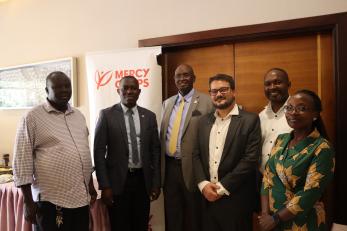
Mercy Corps reaffirms its unwavering commitment to collaborating with the Government of Uganda and diverse stakeholders to tackle climate change. Issuing a clarion call to action, it urges all stakeholders to shift from policy dialogue to concrete implementation, harnessing innovative climate finance Instruments like carbon credits to drive transformative change.
Wrapping up the launch event, the concluding message was clear: “It's time to move beyond conversations and into action, utilizing innovative climate finance instruments such as carbon credits to catalyze transformative change. This approach will empower Ugandan communities to adapt to the evolving challenges of climate change and thrive in harmony.”

